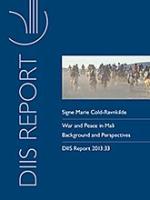DIIS Report
War and peace in Mali
Challenges to the peace- and state-building process
On 25 April 2013 the UN Security Council decided on sending a 12,600-strong peacekeeping force to Mali. In a new DIIS report Signe Marie Cold-Ravnkilde offers an analysis of the basic causes of the crisis in Mali and the central challenges to the country with regard to the coming peace- and state-building process.
The report deals with four central conflict potentials:
- The fragile Malian state and the political crisis in Bamako after the military coup on 22 March 2012 – in relation to this, focus is placed on the long and on-going erosion of Mali’s democratic institutions and on the political positions which presently, in relation to the elections in July 2013, divide opinions in the Malian capital.
- The Tuareg rebellion – its background and current status, and the premises for establishing the necessary process of peace and dialog.
- Organized crime in Mali – its influence on the coming peace-building process and, in connection to this, the need for creating alternative sources of income, especially in the northern part of the country.
- Regional cooperation – the role of regional and international actors in the escalation of the crisis and the handling of militant Islamic groups and organized crime in the region.
These different lines of (potential) conflict should not be seen as separate from each other, but rather as intertwined and mutually intensifying. The report points to an interrelation in the Malian crisis between the local, regional and international dimensions, both historically and in the present situation, which is making the crisis so very difficult to handle.
Regions
Mali
DIIS Experts

Photo/illustration by Lynggaardhansenfoto.dk

War and peace in Mali
Background and perspectives
